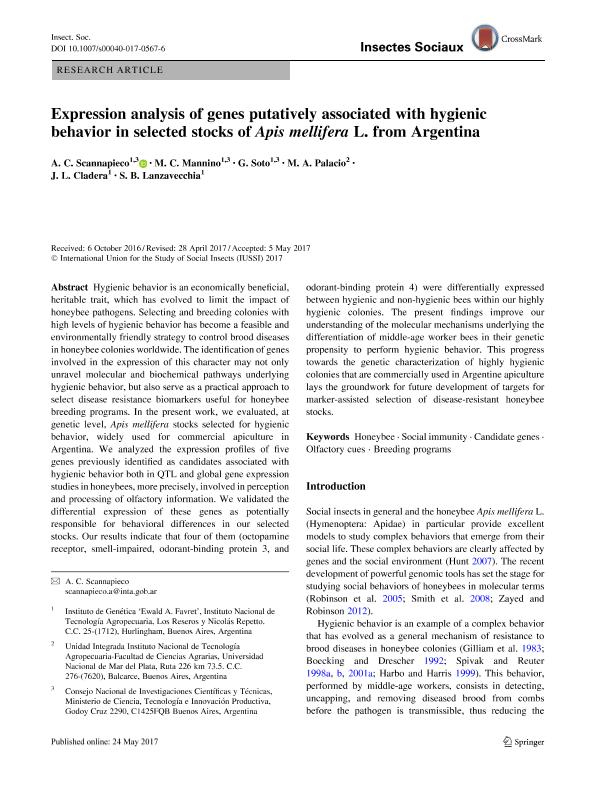Mostrar el registro sencillo del ítem
dc.contributor.author
Scannapieco, Alejandra Carla

dc.contributor.author
Mannino, Maria Constanza

dc.contributor.author
Soto, Gabriela Cynthia

dc.contributor.author
Palacio, M. A.
dc.contributor.author
Cladera, Jorge Luis

dc.contributor.author
Lanzavecchia, Silvia Beatriz

dc.date.available
2018-04-05T20:57:09Z
dc.date.issued
2017-05
dc.identifier.citation
Scannapieco, Alejandra Carla; Mannino, Maria Constanza; Soto, Gabriela Cynthia; Palacio, M. A.; Cladera, Jorge Luis; et al.; Expression analysis of genes putatively associated with hygienic behavior in selected stocks of Apis mellifera L. from Argentina; Birkhauser Verlag Ag; Insectes Sociaux; 64; 4; 5-2017; 485-494
dc.identifier.issn
0020-1812
dc.identifier.uri
http://hdl.handle.net/11336/41013
dc.description.abstract
Hygienic behavior is an economically beneficial,heritable trait, which has evolved to limit the impact of honeybee pathogens. Selecting and breeding colonies with high levels of hygienic behavior has become a feasible andenvironmentally friendly strategy to control brood diseases in honeybee colonies worldwide. The identification of genes involved in the expression of this character may not only unravel molecular and biochemical pathways underlyinghygienic behavior, but also serve as a practical approach to select disease resistance biomarkers useful for honeybee breeding programs. In the present work, we evaluated, at genetic level, Apis mellifera stocks selected for hygienic behavior, widely used for commercial apiculture in Argentina. We analyzed the expression profiles of five genes previously identified as candidates associated with hygienic behavior both in QTL and global gene expression studies in honeybees, more precisely, involved in perceptionand processing of olfactory information. We validated the differential expression of these genes as potentially responsible for behavioral differences in our selected stocks. Our results indicate that four of them (octopaminereceptor, smell-impaired, odorant-binding protein 3, and odorant-binding protein 4) were differentially expressed between hygienic and non-hygienic bees within our highly hygienic colonies. The present findings improve our understanding of the molecular mechanisms underlying the differentiation of middle-age worker bees in their genetic propensity to perform hygienic behavior. This progresstowards the genetic characterization of highly hygienic colonies that are commercially used in Argentine apiculture lays the groundwork for future development of targets for marker-assisted selection of disease-resistant honeybee stocks
dc.format
application/pdf
dc.language.iso
eng
dc.publisher
Birkhauser Verlag Ag

dc.rights
info:eu-repo/semantics/openAccess
dc.rights.uri
https://creativecommons.org/licenses/by-nc-sa/2.5/ar/
dc.subject
Honeybee
dc.subject
Social Immunity
dc.subject
Candidate Genes
dc.subject
Olfactory Cues
dc.subject.classification
Otras Ciencias Biológicas

dc.subject.classification
Ciencias Biológicas

dc.subject.classification
CIENCIAS NATURALES Y EXACTAS

dc.title
Expression analysis of genes putatively associated with hygienic behavior in selected stocks of Apis mellifera L. from Argentina
dc.type
info:eu-repo/semantics/article
dc.type
info:ar-repo/semantics/artículo
dc.type
info:eu-repo/semantics/publishedVersion
dc.date.updated
2018-04-05T13:43:05Z
dc.journal.volume
64
dc.journal.number
4
dc.journal.pagination
485-494
dc.journal.pais
Suiza

dc.journal.ciudad
BASEL
dc.description.fil
Fil: Scannapieco, Alejandra Carla. Consejo Nacional de Investigaciones Científicas y Técnicas; Argentina. Instituto Nacional de Tecnología Agropecuaria. Centro de Investigación en Ciencias Veterinarias y Agronómicas. Instituto de Genética; Argentina
dc.description.fil
Fil: Mannino, Maria Constanza. Consejo Nacional de Investigaciones Científicas y Técnicas; Argentina. Instituto Nacional de Tecnología Agropecuaria. Centro de Investigación en Ciencias Veterinarias y Agronómicas. Instituto de Genética; Argentina
dc.description.fil
Fil: Soto, Gabriela Cynthia. Consejo Nacional de Investigaciones Científicas y Técnicas; Argentina. Instituto Nacional de Tecnología Agropecuaria. Centro de Investigación en Ciencias Veterinarias y Agronómicas. Instituto de Genética; Argentina
dc.description.fil
Fil: Palacio, M. A.. Instituto Nacional de Tecnología Agropecuaria; Argentina. Universidad Nacional de Mar del Plata. Facultad de Ciencias Agrarias; Argentina
dc.description.fil
Fil: Cladera, Jorge Luis. Instituto Nacional de Tecnología Agropecuaria. Centro de Investigación en Ciencias Veterinarias y Agronómicas. Instituto de Genética; Argentina
dc.description.fil
Fil: Lanzavecchia, Silvia Beatriz. Instituto Nacional de Tecnología Agropecuaria. Centro de Investigación en Ciencias Veterinarias y Agronómicas. Instituto de Genética; Argentina
dc.journal.title
Insectes Sociaux

dc.relation.alternativeid
info:eu-repo/semantics/altIdentifier/doi/http://dx.doi.org/10.1007/s00040-017-0567-6
dc.relation.alternativeid
info:eu-repo/semantics/altIdentifier/url/https://link.springer.com/article/10.1007%2Fs00040-017-0567-6
Archivos asociados
